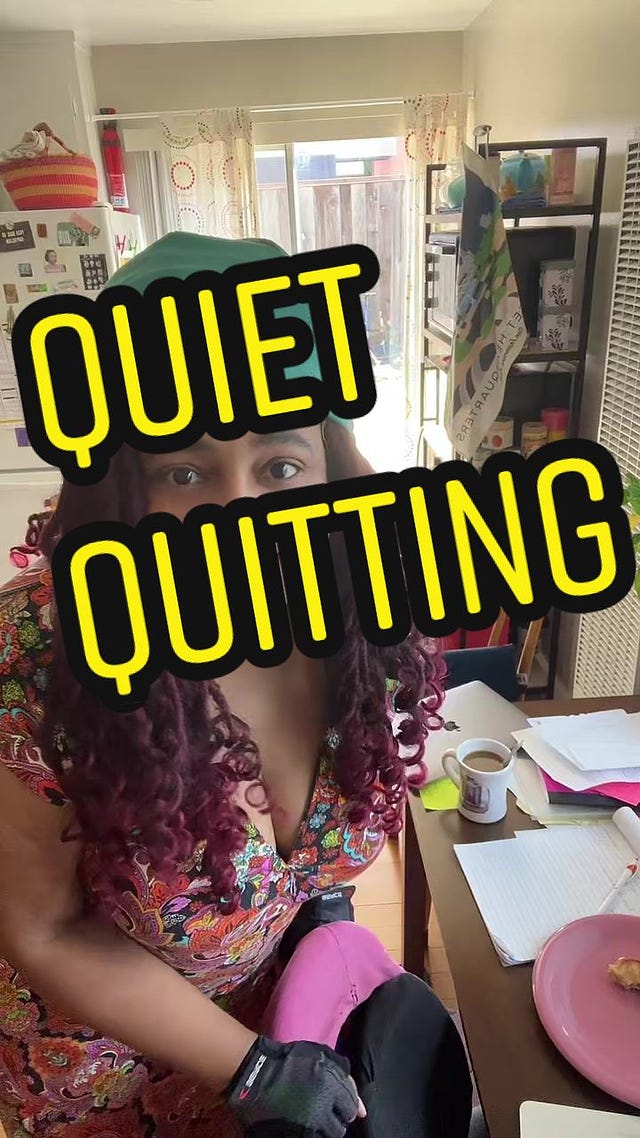If you’re a regular reader of this newsletter, if you open it all the time, if you save it for an escape or forward it to friends and family and have conversations about it— consider becoming a paid subscribing member.
Forgive me. I somehow missed the first flush of discourse about “quiet quitting”: a phrase that proliferated last week on TikTok to describe a supposed movement in which people (particularly younger people) are no longer going above and beyond expectations at work…..but not actually quitting their jobs.
 Tiktok failed to load.
Tiktok failed to load.Enable 3rd party cookies or use another browser
My first reaction was, perhaps, ungenerous: so this is just a way of people talking about doing their jobs as described? There’s nothing novel about wanting enough money to live comfortably but not being particularly ambitious. It’s easy, from my position (or maybe your own) to look at this idea and think: young people discovering coasting is like young people discovering, I dunno, Tupac, or Joni Mitchell, or the fact that JAWS really is good.
But people have to arrive at revelations — about work and hustle culture, about art and taste, about intimacy and vulnerability — on their own terms. They can be assisted or prompted or cajoled by various texts, as the Greatest Generation was by Man in the Grey Flannel Suit and Boomers were by The Graduate and Gen X was by Slacker and Generation X and Elder Millennials were by Office Space or (oh god) Fight Club….but the discourse has to somehow feel organic and earned, like a secret you discover, instead of wisdom passed down. These revelations are also often the privilege of people who, up until that point in their lives, had been able to keep their faith in meritocracy, and that working hard does mean that doors will always open to you, etc. etc. There’s a reason, in other words, that all of those texts I mention above are very, very fucking white and masculinist.
Today, this message is exploding on TikTok, alongside slightly annoyed responses from jaded millennials like me who already figured out the morally and (often financially) bankrupting properties of hustle culture, and still more responses calling attention to the ways in which only people with certain types of societal privilege are able to coast, because their race or gender presentation makes it so that people already believe in their baseline of competence, whereas others have to go above and beyond just to be understood as competent, the list goes on.
Put differently, consumers of this message aren’t just receiving the one TikTok of a guy musing on how he’s come to understand that his identity can be disarticulated from his job — they’re consuming that message within an intersectional critique and refinement of that message. As Claudia Alick puts it below, “It’s not quiet quitting. It’s resisting wage theft. Every couple of years, people will try to repackage a good idea in a way that obfuscates it and makes it harder to actually get to. You’re not quiet quitting, you’re just resisting being stolen from.”
 Tiktok failed to load.
Tiktok failed to load.Enable 3rd party cookies or use another browser
I’ve yet to see any TikToks that explicitly connect the dots between “quiet quitting” and what’s long been known within labor activism as “work to rule,” which is when a group of workers collectively decide to really do the bare minimum of their job descriptions. (If you’ve seen them, please post in the comments!) The gears of production — in a factory or a fast food kitchen or an office — never grind to a halt, as they would in a work stoppage. They just become sluggish and intolerable. The goal: communicate just how much employers depend on motivated, engaged workers who feel adequately and fairly compensated for the work that they do. That communication only actually produces change, though, when there are enough people doing it together that it becomes impossible to ignore.
“Quiet quitting” can function as a sort of quiet rebellion on the part of the individual — not dissimilar to (sorry) Troy Dyer (Ethan Hawke) stealing a candy bar from his gas station job every day. But when these rebellions remain individual, they also fail to change the system — and instead become fodder for older generations to complain about why younger people have not yet reconciled themselves to their continued exploitation. The popularization of a phrase like “quiet quitting” just gives the people squawking “nobody wants to work anymore” (which they have been doing since at least 1894) a new vocabulary word to insert into their argument.
In short: yes, get on board with the ethos of quiet quitting. But when you start talking about it with others — in your workplace, across your industry, in the classroom, on the internet, wherever — well, that’s the kernel of collective action. Call and conceive of it by its name. Its power, your power, lies in that act of translation.
PS: Charlie and I went on the Ezra Klein Show to talk about future of work stuff + all those back to the office plan bungles. Listen and read the transcript here.
Are you ready to join the community? Do you want access to the weekly links and “Just Trust Me?” Do you to be able to comment and be part of the Discord? Well, then:
Subscribing is how you’ll access the heart of Culture Study. There’s those weirdly fun/interesting/generative weekly discussion threads, plus the Culture Study Discord, where there’s dedicated space for the discussion of this piece, plus equally excellent threads for Job-Hunting, Reproductive-Justice-Organizing, Moving is the Worst, No Kids Club, Chaos Parenting, Real and Potential Austen-ites, Gardening and Houseplants, Navigating Friendships, Solo Living, Fat Space, Lifting Heavy Things, and so many others dedicated to specific interests, fixations, obsessions, and identities.
If you’ve never been part of a Discord: I promise it’s much easier and less intimidating than you imagine.
As always, if you are a contingent worker or un- or under-employed, just email and I’ll give you a free subscription, no questions asked. If you’d like to underwrite one of those subscriptions, you can donate one here.
If you’re reading this in your inbox, you can find a shareable version online here. You can follow me on Twitter here, and Instagram here — and you can always reach me at annehelenpetersen@gmail.com.







**MY APOLOGIES** FOR MESSING UP THE 'JUST TRUST ME' LINK FOR SUBSCRIBERS! HERE IT IS!!!! https://maxread.substack.com/p/the-man-who-bought-pine-bluff-arkansas
Third Gen union member here. There is an actual labor relations term for this practice. It’s “work to the letter.” That means doing only what the contract specifies. No overtime, no staying 10 minutes longer to finish a meeting, no taking work home. In short, nothing for while a union member is not compensated. It is a way for unions to stage slowdowns without strikes - often a very effective way.